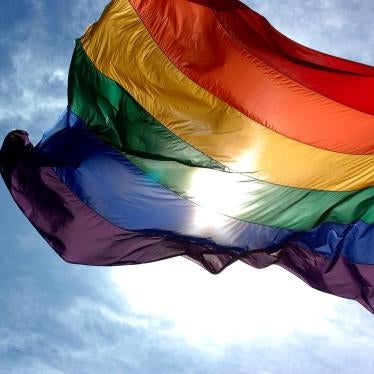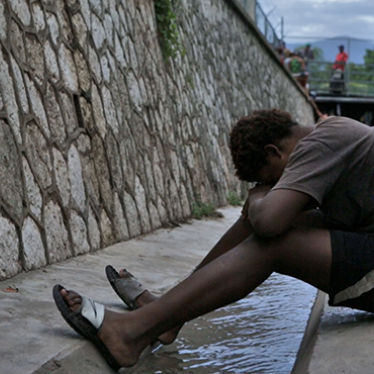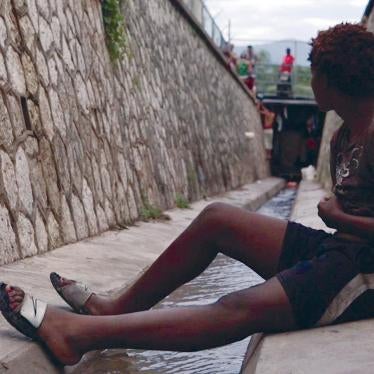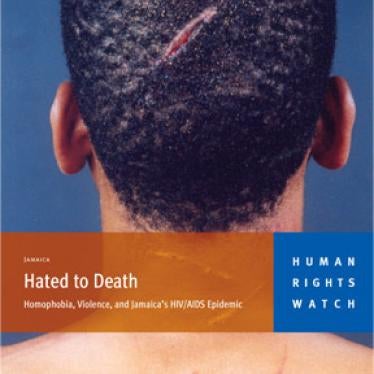In 2006, Time named Jamaica the most homophobic country on earth. Whether that report was accurate or not, violence against LGBT people in Jamaica today is rampant. Police, schools, and hospitals discriminate against LGBT people in Jamaica. But attitudes are shifting and a heated public debate about LGBT rights is taking place within the government, in churches, and in both blogs and the mainstream media. The debate is spurred, in part, by the brutal murder last year of a transgender youth, Dwayne Jones. A mob chased the 16-year-old, who was wearing women’s clothing at a party, into a crowded street, where people stabbed him, shot him three times, and deliberately ran over him with a car. Rhon Reynolds, the researcher, talks with Amy Braunschweiger about the new Human Rights Watch report, Not Safe at Home, and what Jamaica should do to protect LGBT people.
Is homosexuality outlawed in Jamaica?
No, but Jamaica does have British Colonial “buggery laws” on its books that outlaw men having anal sex with men. It also has “gross indecency” laws that outlaw physical intimacy between men, in public or private. There are no laws targeting lesbians, but they’re still discriminated against. Prime Minister Portia Simpson-Miller has talked openly about getting rid of the buggery laws, but she’s taken no significant, concrete action in this direction. Her words are a step in the right direction – especially considering that Jamaica’s previous prime minister, Bruce Golding, said on the BBC that no homosexuals would be allowed in his cabinet. But she needs to do more.
Why is Jamaica so homophobic?
Jamaica’s a heavily Christian society, and evangelical communities are organizing conferences and marches around any hint of overturning the buggery laws. When rumors swirled last summer that Miller would repeal the buggery laws, 25,000 anti-gay-rights demonstrators and religious leaders took to the streets in protest.
Although it plays less of a role today, since the 90’s major-label reggae artists have released songs promoting violence and hatred toward LGBT people – so called “murder music.” I remember being a teenager in Jamaica in the early 90s and listening to the song Boom Bye Bye by Buju Banton. It was a huge hit in Jamaica and internationally. But a friend of my parents stopped me, said the song was about killing a gay man, that I shouldn’t sing along. It was the first time I’d heard anyone say that.
Since that time, groups – including Jamaica’s diaspora – began mobilizing against this music, and as a result countries like Germany, the Netherlands, and Canada canceled tours and denied travel visas for certain artists. Some of the artists made public apologies. But times are changing. The popular reggae musician Diane King came out as a lesbian, and the artist Mista Majah P released an album supporting LGBT rights in Jamaica.
When it comes to context, it’s important to remember that Jamaica has a high murder rate, crime rate and poverty rate, so we can’t look at anti-LGBT violence in isolation. But what’s unique to hate crimes in Jamaica is that almost none of the cases documented in the report have led to a police investigation or an arrest. Because of the amount of rage fueling these crimes, the government should take the lead in developing and implementing hate crime legislation.
What does this hate look like in the lives of LGBT people?
I met Max, a slight man in his early 20s, when he was volunteering for the LGBT nonprofit JFLAG in Jamaica. He was homeless and broken. Max grew up in a tight community, he said, but he lost his home, job, family and friends – all because he was gay. While living with his aunt, he hid his sexuality by hanging out with a gangster and having a girl regularly visit his house. But when a neighbor told his aunt Max was gay, she kicked him out. That same day, a sympathetic older woman took him in, but a carload of people pulled up to her house and threatened to torch it if he didn’t leave. The older woman called the police to escort him to safety. Max cried when he told me that, instead of protecting him, the police handcuffed him and beat him after they took him away.
I also spoke with a lesbian couple who had three kids between them. They had to move five times because of violent anti-gay threats. One night after a dinner party, two men held them up at gunpoint and forced the couple into their home. The men raped them, forced each woman to watch the other being violated. They beat them terribly while spewing hate speech. When the couple reported the attack to the police, the officers called them “dirty sodomite girls” and refused to take an incident report. The women have since received asylum elsewhere, but were forced to leave their children in Jamaica.
Based on these two stories, the police are part of the problem.
Yes. Although, to be fair, there has been improvement over the past decade. When Human Rights Watch released its first report on LGBT rights in Jamaica in 2004, the situation was even worse. Today, police are less likely to be perpetrators of violence and are a bit more likely to respond. I spoke with a gay policeman for the report – he lives in terror of the violence he’d face if others learned about his sexuality – and he knew of many cases where police refused to document, investigate, or make arrests around homophobic violence. The vast majority of LGBT people I spoke with said the police made fun of them and verbally abused them if they attempted to file a report. Many LGBT people still find trusting the police difficult, never mind asking them for help.
With homophobia so culturally entrenched, will changing laws be enough?
The government will need to do more. It should promote a dialogue around LGBT rights. Schools could have discussions around identity and sexuality. Hospitals and clinics should guarantee confidentiality. Now, gay people can’t openly talk to doctors and nurses without being afraid of being outed in their community – and of the violence that may follow. Not surprisingly, Jamaica has a high HIV rate. If people are trying to hide their identity, they won’t be able to access important HIV information.
The government needs to exhibit leadership here. In its past, Jamaica has combated colonialism and slavery. Its motto is “out of many, one people.” This sense of diversity and inclusivity is supposedly Jamaica’s ethos. If Jamaica really embraces these principles, leadership in the area of LGBT rights should follow.








